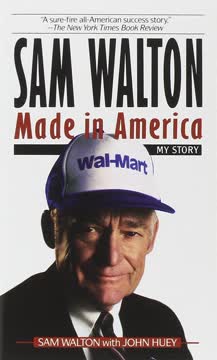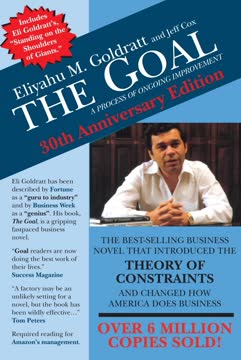Principais conclusões
1. Meritocracy and Partnership: The Foundation of Success
"Good people, working together, make the firm great."
Meritocracy as a core value. Jorge Paulo Lemann, Marcel Telles, and Carlos Alberto Sicupira built their business empire on the principles of meritocracy and partnership. They believed in rewarding performance, not status or tenure.
Partnership model. Their approach involved:
- Offering ambitious young talents the opportunity to become partners
- Linking compensation directly to performance
- Encouraging a sense of ownership among employees
- Fostering a culture of continuous improvement and results-driven mindset
This model attracted and retained top talent, creating a virtuous cycle of success across their various ventures.
2. The Garantia Culture: A Blueprint for Business Excellence
"It was as though you had thrown five gorillas into a cage and left a female outside. Somebody was going to die."
Intense work environment. Garantia, the investment bank founded by Lemann, became known for its:
- Highly competitive atmosphere
- Long working hours and high-pressure environment
- Constant evaluation of performance
- Aggressive bonus structure
Cultural pillars. The Garantia culture was built on:
- Simplicity and frugality
- Focus on results
- Continuous learning
- Attracting and developing top talent
- Sharing success through partnership
This culture, though intense, produced extraordinary results and became a template for their future ventures.
3. From Banking to Beer: Transforming Brahma into a Global Powerhouse
"Tropical country, hot climate, good brand, young population and poor management... OK, that gives us everything we need to transform it into something great."
Applying financial expertise to brewing. When Lemann and his partners acquired Brahma in 1989, they applied their Garantia-style management to the brewing industry:
- Implemented strict cost controls
- Introduced performance-based compensation
- Invested in marketing and distribution
- Focused on operational efficiency
Global ambitions. They set their sights on international expansion, starting with:
- Acquisitions in Latin America
- Partnerships with international brands
- Continuous improvement of operations and management
This transformation laid the groundwork for Brahma's eventual rise to global prominence in the beer industry.
4. The Art of Acquisition: Merging Brahma and Antarctica
"It was like joining the rival São Paulo and Corinthians football clubs to make a single team."
Strategic merger. The 1999 merger of Brahma and Antarctica to form AmBev was a pivotal moment:
- Created Brazil's largest brewery
- Faced significant regulatory and cultural challenges
- Required careful negotiation and public relations management
Integration challenges. The merger involved:
- Combining two distinct corporate cultures
- Streamlining operations and cutting costs
- Managing public perception and regulatory approval
This merger showcased the group's ability to execute complex deals and integrate large organizations, setting the stage for future global acquisitions.
5. Going Global: The Creation of InBev and AB InBev
"Mission announced is mission accomplished."
International expansion. The formation of InBev in 2004 through the merger of AmBev and Interbrew marked a major step towards global dominance:
- Combined strengths of Brazilian and Belgian brewing traditions
- Created the world's largest brewer by volume
- Faced challenges in integrating different corporate cultures
Acquiring Anheuser-Busch. The 2008 acquisition of Anheuser-Busch was the culmination of their global strategy:
- $52 billion deal to create AB InBev
- Implemented aggressive cost-cutting measures
- Introduced their management style to an American icon
These moves solidified their position as leaders in the global brewing industry, demonstrating their ability to manage and integrate large, complex organizations.
6. The Power of Focus: Concentrating on Core Strengths
"Having a big dream brings as much work as having a small dream."
Strategic focus. Lemann and his partners consistently emphasized:
- Concentrating on core businesses
- Divesting non-core assets
- Pursuing ambitious but focused goals
Examples of focus:
- Selling Garantia to focus on brewing and retail
- Stepping back from GP Investimentos to concentrate on global brewing
- Creating 3G Capital to pursue focused investments in the U.S.
This approach allowed them to excel in their chosen fields and avoid the pitfalls of overextension.
7. Continuous Learning and Adaptation: Keys to Long-Term Success
"Seek mentors and teachers, and connect them together."
Culture of learning. The trio consistently sought knowledge and improvement:
- Studied successful companies like Goldman Sachs and Walmart
- Engaged with thought leaders like Jim Collins
- Encouraged employees to pursue education and self-improvement
Adapting to new challenges. They showed flexibility in:
- Transitioning from banking to retail and brewing
- Navigating different business cultures across countries
- Evolving their management style to suit global operations
This commitment to learning and adaptation enabled them to succeed across different industries and geographies.
8. Building a Legacy: Preparing the Next Generation
"Our investment is worth more as a block than if it was dispersed."
Long-term vision. Lemann, Telles, and Sicupira focused on creating lasting institutions:
- Developed a shareholders' agreement to preserve future relations among heirs
- Created educational opportunities for children of partners and employees
- Encouraged heirs to understand the business without working directly in it
Succession planning. They prepared for the future by:
- Grooming talented executives like Carlos Brito
- Gradually reducing their direct involvement in operations
- Establishing foundations and educational initiatives
This approach aimed to ensure that their business philosophy and success would continue beyond their personal involvement.
Última atualização:
FAQ
What's Dream Big about?
- Entrepreneurial Journey: Dream Big chronicles the journey of Jorge Paulo Lemann, Marcel Telles, and Carlos Alberto Sicupira as they build AB InBev, one of the largest brewing companies globally.
- Leadership and Culture: The book highlights their strategic decisions, leadership lessons, and the unique culture they fostered, emphasizing meritocracy and performance.
- Inspiration for Entrepreneurs: It serves as a motivational narrative for aspiring entrepreneurs, showcasing how ambition and hard work can transform industries.
Why should I read Dream Big?
- Real-Life Insights: Gain insights into the experiences of successful entrepreneurs, offering practical guidance for business enthusiasts.
- Cultural Philosophy: Understand the meritocratic and performance-driven culture that Lemann and his partners created, applicable to various organizations.
- Motivational Story: The book inspires readers to pursue their dreams, emphasizing resilience and continuous improvement.
What are the key takeaways of Dream Big?
- Invest in People: Emphasizes the importance of investing in talented individuals and fostering their growth for organizational success.
- Ambitious Goals: Highlights the need for Big Hairy Audacious Goals (BHAGs) to maintain momentum and encourage innovation.
- Meritocratic Culture: Stresses creating a culture where performance is rewarded, ensuring the best ideas and talents rise to the top.
What are the best quotes from Dream Big and what do they mean?
- “In the end, I am a teacher...”: Reflects Lemann's belief in mentorship and empowering others through knowledge sharing.
- “Simplicity has genius and magic...”: Emphasizes solving complex problems with simple, clear strategies.
- “You can export a great culture...”: Highlights the adaptability of a strong company culture across industries and geographies.
Who are the main figures in Dream Big?
- Jorge Paulo Lemann: Central figure known for his strategic vision and leadership, transforming from a young banker to a global business leader.
- Marcel Telles: Recognized for operational expertise and commitment to excellence, playing a key role in transforming companies like Brahma.
- Carlos Alberto Sicupira: Known for his aggressive business approach and cost control, significantly impacting company performance.
What is the significance of the "Dream-People-Culture" model in Dream Big?
- Core Philosophy: Represents the trio's approach to building successful companies, emphasizing dreams, people, and culture.
- Sustained Success: Aligning these elements leads to sustained success, with a clear vision and focus on talent and culture.
- Adaptability: Demonstrates that strong cultural values can transcend specific business contexts and industries.
How did Lemann and his partners approach risk management in Dream Big?
- Calm Decision-Making: Maintained a calm and disciplined approach during crises, focusing on understanding situations before acting.
- Long-Term Focus: Prioritized long-term implications over short-term gains, effectively navigating challenges while keeping goals in sight.
- Strong Governance: Emphasized a strong board of directors as a strategic asset, guiding the company through turbulent times.
How did the acquisition of Brahma transform the brewing industry according to Dream Big?
- Market Consolidation: Led to the creation of AB InBev, reshaping the competitive landscape and setting new standards for efficiency.
- Cultural Integration: Integrated Brahma's operations with the founders' philosophies, emphasizing meritocracy and cost control.
- Global Expansion: Paved the way for global expansion, demonstrating the potential for Brazilian companies to compete globally.
What challenges did Lemann and his partners face during their journey as described in Dream Big?
- Economic Instability: Navigated Brazil's economic instability, including hyperinflation and political uncertainty, with strategic foresight.
- Cultural Resistance: Faced resistance when implementing meritocratic culture in established companies, requiring strategic change management.
- Market Competition: Dealt with intense competition, necessitating innovation and maintaining a competitive edge for success.
What management strategies are discussed in Dream Big?
- Meritocratic Culture: Emphasizes rewarding employees based on performance, fostering motivation and driving results.
- Cost-Cutting Initiatives: Details rigorous cost control measures, like the Zero Base Budget program, improving profitability.
- Talent Development: Highlights recruiting and nurturing young talent through trainee programs, sustaining growth.
How did the authors approach company acquisitions?
- Strategic Vision: Acquisitions were approached with a clear vision, aiming for synergies and enhanced market position.
- Cultural Integration: Emphasized integrating corporate cultures post-acquisition, ensuring successful management style adoption.
- Focus on Efficiency: Applied principles of efficiency and cost control to improve performance and profitability in acquired companies.
What is the significance of the title Dream Big?
- Ambition and Vision: Reflects the authors' ambitious vision and belief in dreaming big to achieve extraordinary results.
- Inspiration for Others: Serves as a motivational call for aspiring entrepreneurs to pursue dreams with determination.
- Cultural Shift: Signifies the shift towards a dynamic and ambitious business approach, moving away from traditional practices.
Avaliações
Dream Big receives mostly positive reviews for its inspiring account of Brazilian entrepreneurs who built a global business empire. Readers praise the insights into management principles and business strategy. Some criticize the writing style as overly journalistic or lacking depth. A few express discomfort with the aggressive cost-cutting and meritocratic culture portrayed. Overall, reviewers find the story of Lemann, Telles and Sicupira's rise fascinating, even if the book's execution is imperfect.
Similar Books














